M&A landscape: nothing chunky to buy, lots to break up
Inspired by the bear, threatened by the bull or vice versa?
GM: RAISING THE ROOF GGM: IN FULL THROTTLE GZIM: MAERSK BOOST KNIN: READ-ACROSSMAERSK: NOT ENOUGHMAERSK: GUIDANCE UPGRADEZIM: ROLLERCOASTERCAT: HEAVY DUTYMAERSK: CATCHING UP PG: DESTOCKING PATTERNSPG: HEALTH CHECKWTC: THE FALLGXO: DEFENSIVE FWRD: RALLYING ON TAKEOVER TALKODFL: STEADY YIELDVW: NEW MODEL NEEDEDWTC: TAKING PROFIT
GM: RAISING THE ROOF GGM: IN FULL THROTTLE GZIM: MAERSK BOOST KNIN: READ-ACROSSMAERSK: NOT ENOUGHMAERSK: GUIDANCE UPGRADEZIM: ROLLERCOASTERCAT: HEAVY DUTYMAERSK: CATCHING UP PG: DESTOCKING PATTERNSPG: HEALTH CHECKWTC: THE FALLGXO: DEFENSIVE FWRD: RALLYING ON TAKEOVER TALKODFL: STEADY YIELDVW: NEW MODEL NEEDEDWTC: TAKING PROFIT

Efforts to curtail the supply chain of counterfeit goods should be part of the everyday practice of supply chain service providers, delegates at the TOC Container Supply Chain conference in Rotterdam heard this morning.
Incorporating a “Know Your Customer” (KYC) principle into the Business Action to Stop Counterfeiting and Piracy (BASCAP) group of major shippers, shipping lines and freight service providers should also help government agencies, such as customs authorities, join the battle.
Marilyne Serafin, head of intellectual property at French luxury goods manufacturer Longchamp, said: “We, as brand owners, need to explain and convince certain governments and law enforcement that counterfeiting matters, that we need their support and cooperation, and that they might be surprised at what they find if they look closer at the issue of counterfeiting.
“Hopefully, these authorities will be even more encouraged by the best practices now in place between brand owners and maritime operators, as this is the sign that we manage to raise awareness in other industries as well.”
Alan Owen, director of customs services in Europe at Expeditors, added that the ‘Authorised Economic Operator’ status enjoyed by many forwarders and carriers should be “accustomed to deploying a KYC practice, as this is a requirement for certification”.
He explained: “The SAFE Framework of Standards of the World Customs Organisation (WCO) asks of certified economic operators to not only know their customers, but also work with their customers to ensure that the supply chain is secure. Focus has, however, always been on security issues – the BASCAP best practice asks of participants to pay a little more attention to the kind of freight that is being tendered for transportation and to identify, if possible, any illicit goods.”
However, he warned that government agencies were finding themselves increasingly stretched, given their widening range of responsibilities.
“We operate in a heavily regulated environment – an environment where governments, customs and other law enforcement agencies are under considerable pressure to exercise sufficient controls at borders. They try to do this with ever-declining resources – personnel as well as infrastructure.
“I do, however, think these agencies will be more successful in their task if they also deployed more effective border controls. By, for example, facilitating legitimate trade more effectively and concentrating their limited resources on participants in the supply chain that do not follow the best practices put forward by the SAFE Framework or BASCAP,” he said.
But there are also considerable reasons for customs agencies to devote more resources to tackling counterfeit supply chains, argued Unilever’s global brand protection manager, Meena Sayal.
“The recent studies by the OECD and EU, for example, show that 5% of all goods – worth €85bn – imported into the EU are counterfeit. This is a region where IP-intensive industries are of huge economic benefit, as they account for 42% of total economic activity, worth €5.7trn.
“Governments have a key role to play, both as policy makers seeking to protect that economic benefit, and as the creators of enforcement legislation.
“Law enforcement is the front line, utilising that legislation supported by legitimate business,” she said.
Comment on this article